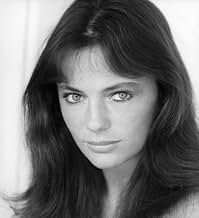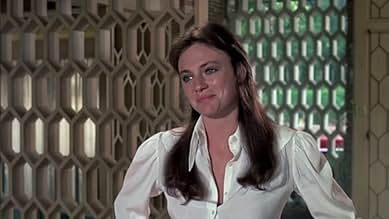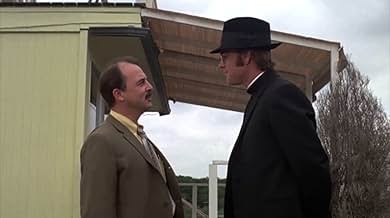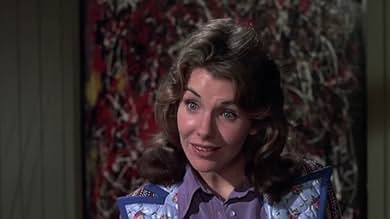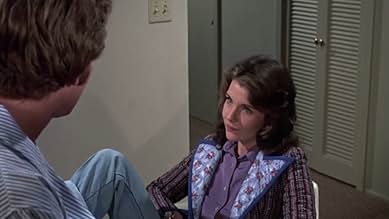IMDb-BEWERTUNG
6,1/10
1365
IHRE BEWERTUNG
Füge eine Handlung in deiner Sprache hinzuA computer programmer decides to become a thief. And when he starts making waves an insurance investigator hounds him. He also meets a woman who becomes his accomplice.A computer programmer decides to become a thief. And when he starts making waves an insurance investigator hounds him. He also meets a woman who becomes his accomplice.A computer programmer decides to become a thief. And when he starts making waves an insurance investigator hounds him. He also meets a woman who becomes his accomplice.
- Regie
- Drehbuch
- Hauptbesetzung
Ollie Ree Alridge
- Maid
- (Nicht genannt)
Jim Antonio
- Poker Player
- (Nicht genannt)
Army Archerd
- Newsman
- (Nicht genannt)
Empfohlene Bewertungen
Ryan O'Neal was so clever and seductive in this movie, I wanted to go to bet with him too. The focal point of the movie is the fascinating love story -- not between O'Neal and Bisset or between O'Neal and Jill Clayburgh -- both of which were quite entertaining, but the cerebral symbiotic linkage between Warren Oates and O'Neal. This has to be Oates' best performance of all time. Young Ned Beatty and Charles Cioffi are very good --leading a quite capable supporting cast. Very enjoyable movie.
Considering that its been close to forgotten, TTWCTD was a pleasant and substantial surprise when I watched it a few years ago.
This is far from a perfect film as it has several flaws. While the caper scenes involving central character Webster McGee's (Ryan O'Neal) are entertaining enough they're hardly groundbreaking and have been done better in other films. And as another reviewer said, the film probably could've done without the segment involving the arrogant chess expert Zukovsky (played by Austin Pendelton). While not without humour, in the context of the rest of the film it's played too broadly by Pendelton and doesn't really fit in.
But there is much of interest in this film that make it well worth catching up with. The central romance between O'Neal and wealthy socialite Jackie (who gives him his chance to move into the upper echelons of society) played by Jacqueline Bisset isn't really that convincing, perhaps deliberately so. McGee's attraction to the vacuous and cold Laura only makes sense in the context of Jill Clayburgh's performance as McGee's ex-wife Jackie. In her brief on-screen time, Jackie comes across as a far more likable persona then the cold and chilly Laura (doubtless this is also because Bisset has always come across as a cold and unlikable personality for mine). But we can see in Jackie's one scene with Webster that she has tics and neuroses that remind Webster of his past and he has moved on with someone far more frivolous and insubstantial.
But the really fascinating part of the film is the relationship between McGee and the insurance investigator Dave Riley. If this film were made today, Riley would most likely be portrayed as a harried, bumbling 'loser' with McGee (and the filmmakers) regularly mocking his failure to catch him at every turn.
But TTWCTD does something highly unusual and daring. It has McGee display immense sympathy and empathy for Riley even as he's doing his best to catch him. Why? Because he knows that he was just like him previously - someone stuck in a dead-end job trying to do their best but feeling immensely dissatisfied about their life and feeling helpless to do anything about it.
It's this relationship which is the real strength of the film, helped especially by Oates' marvellous performance as Riley and helps it stay in the memory long after one has finished watching it.
And while it has its detractors, I also found Henry Mancini's music score very pleasing on the ear.
This is far from a perfect film as it has several flaws. While the caper scenes involving central character Webster McGee's (Ryan O'Neal) are entertaining enough they're hardly groundbreaking and have been done better in other films. And as another reviewer said, the film probably could've done without the segment involving the arrogant chess expert Zukovsky (played by Austin Pendelton). While not without humour, in the context of the rest of the film it's played too broadly by Pendelton and doesn't really fit in.
But there is much of interest in this film that make it well worth catching up with. The central romance between O'Neal and wealthy socialite Jackie (who gives him his chance to move into the upper echelons of society) played by Jacqueline Bisset isn't really that convincing, perhaps deliberately so. McGee's attraction to the vacuous and cold Laura only makes sense in the context of Jill Clayburgh's performance as McGee's ex-wife Jackie. In her brief on-screen time, Jackie comes across as a far more likable persona then the cold and chilly Laura (doubtless this is also because Bisset has always come across as a cold and unlikable personality for mine). But we can see in Jackie's one scene with Webster that she has tics and neuroses that remind Webster of his past and he has moved on with someone far more frivolous and insubstantial.
But the really fascinating part of the film is the relationship between McGee and the insurance investigator Dave Riley. If this film were made today, Riley would most likely be portrayed as a harried, bumbling 'loser' with McGee (and the filmmakers) regularly mocking his failure to catch him at every turn.
But TTWCTD does something highly unusual and daring. It has McGee display immense sympathy and empathy for Riley even as he's doing his best to catch him. Why? Because he knows that he was just like him previously - someone stuck in a dead-end job trying to do their best but feeling immensely dissatisfied about their life and feeling helpless to do anything about it.
It's this relationship which is the real strength of the film, helped especially by Oates' marvellous performance as Riley and helps it stay in the memory long after one has finished watching it.
And while it has its detractors, I also found Henry Mancini's music score very pleasing on the ear.
There are some humorous scenes, some suspense, some great Houston locations, some really bad 1970s clothes and some interesting architecture,
This film relies mostly on the attractiveness and charm of its leads in their physical prime.
This film relies mostly on the attractiveness and charm of its leads in their physical prime.
In 1973, the best chess programs running on the fastest supercomputers could barely play a passable game of chess, much less challenge a master level player such as the Austin Pendleton character would be (newspaper chess columnist for the Houston Chronicle).
I've seen this film twice, and I like it quite a bit. It's possibly the best performance O'Neal has given, Oates does a nice turn, and it has Jackie Bisset. The plot is okay, but the performances really give this film its punch. "Thief..." may not be for everyone, but it's worth a shot. The film may seem a bit dated and slow, so viewer beware.
Wusstest du schon
- WissenswertesJacqueline Bisset took over the role of Laura from Charlotte Rampling, who bowed out because of pregnancy. [VARIETY, Mar 15, 1972]
- PatzerTravis is pulled over by police and is asked for the car's registration. In the 1970s, Texas did not require that the registration be kept in the car, and officers did not ask for it. Hollywood got it wrong because in California drivers were required to present their "registration".
- VerbindungenFeatured in Gazap Rüzgari (1983)
Top-Auswahl
Melde dich zum Bewerten an und greife auf die Watchlist für personalisierte Empfehlungen zu.
- How long is The Thief Who Came to Dinner?Powered by Alexa
Details
Box Office
- Bruttoertrag in den USA und Kanada
- 679.839 $
Zu dieser Seite beitragen
Bearbeitung vorschlagen oder fehlenden Inhalt hinzufügen

Oberste Lücke
By what name was Webster ist nicht zu fassen (1973) officially released in India in English?
Antwort
